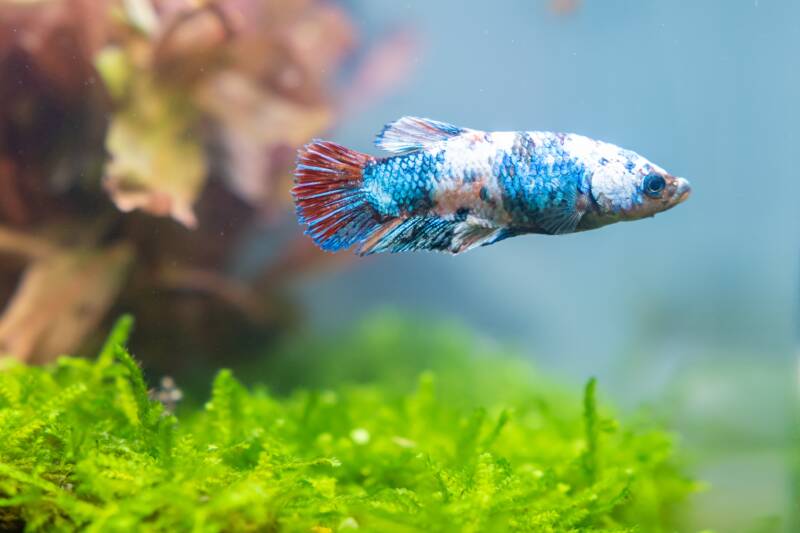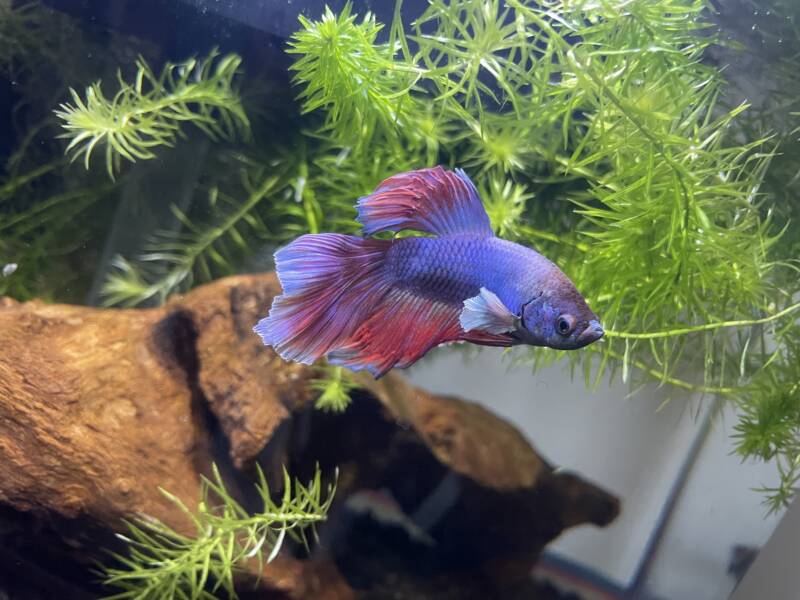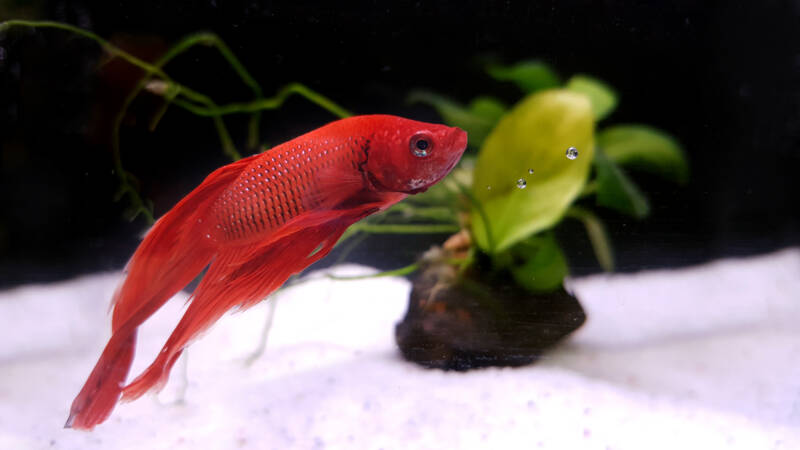What do you do with your fish when you go on vacation? Is it ok to leave your betta fish for the weekend? Will your fish starve if left for a few days?
For its small size, your betta is incredibly hardy. Wild specimens can survive up to 14 days without food, while domestic aquarium bettas can live from five to 10 days.
Just because your fish can survive without food for that long does not mean that you should risk it unnecessarily.
These numbers are specific to betta fish. Not all popular aquarium species can last the same number of days between feedings.
The upper limits of these ranges also assume that your fish is otherwise healthy and is kept in excellent water conditions.
Remember that four to five days should be the maximum amount of time that your betta is without food. After that period, the fish will begin to starve.
Leaving your fish without food for this long regularly is not healthy.
Below we will discuss how long you can safely leave your betta fish without food, as well as ideas for keeping your fish healthy during longer getaways.

The Betta’s Natural Feeding Process
The first thing to know when planning care for your betta is how it naturally feeds.
Wild bettas are carnivores, constantly on the hunt for insects that fall into the water.
They will also eat any small crustaceans or larvae they can find. As not every hunt is successful, wild bettas are conditioned to go for days without food.
Your domestic betta retains some of this capability, albeit to a lesser extent. As such, they will not suffer ill effects from short periods without food.
Fasting is a natural part of a betta fish’s diet, which makes it easy for you to get away for short trips without too much worry about your fish’s wellbeing.
Regular Fasting for Your Betta
Even when not on vacation, many betta owners will fast their fish for one to two days a week.
Alternatively, an “every other day” feeding schedule can help to make sure your betta is not overfed and has time between meals to digest their food.
Always make sure that the food you are giving your betta is high quality and fresh. Add in a weekly treat of live or frozen food to round out their diet.
How Long Can Your Betta Go Without Eating?

For its small size, your betta is incredibly hardy. Wild specimens can survive up to 14 days without food, while domestic aquarium bettas can live from five to 10 days.
Just because your fish can survive without food for that long does not mean that you should risk it unnecessarily.
These numbers are specific to betta fish. Not all popular aquarium species can last the same number of days between feedings.
The upper limits of these ranges also assume that your fish is otherwise healthy and is kept in excellent water conditions.
Remember that four to five days should be the maximum amount of time that your betta is without food. After that period, the fish will begin to starve.
Leaving your fish without food for this long regularly is not healthy.
Long or repeated periods without food can stress your fish, cause an increase in aggression levels, and can severely impact your betta’s ability to fight off infections.
Caring for Your Betta While on Vacation
The most important things to consider when you are planning a vacation are:
- How, or even if, you need to feed your betta during the time you are gone
- Caring for your aquarium water.
Feeding Your Betta While on Vacation
Always consider options to provide the best care for your betta fish. The amount of care you need to plan for depends on the length of your trip.
The following table gives guidelines for varying timeframes.
| Trip Length | Options |
| 2 – 3 days | Fasting your betta is an acceptable option for this short period, just do not make it a regular occurrence. |
| 1 week | Get a pet sitter. Ideally, they should come by at least every other day to feed and check on your betta.
or Consider an automatic feeder, which you can install on your tank to portion out the correct number of pellets at the right time. |
| More than 1 week | You will need a sitter for longer periods. Not only will you need a reliable person to ensure your fish is fed, but you will also need someone who can perform a partial water change to keep your aquarium water in top shape. |
Why are These Options So Important?
The longer your betta is out of your care, the more chances there are for issues arising that can impact your fish’s health.
Health Issues from Overfeeding
An inexperienced caregiver can easily overfeed the opportunistic betta. Regular overfeeding can lead to unhealthy weight, bloating, constipation, and swim bladder disease.
Thus, short fasting periods are not going to harm your betta and can allow their digestive system time to process their food.
Bettas have small stomachs, roughly the size of their eye. As a result, they do not need much food per feeding.
Two to three betta pellets twice a day is the general recommendation for a healthy amount and schedule.
Health Issues from Underfeeding
Aside from the obvious starvation, letting your betta go for days without food is dangerous to their health.
Not only does it raise their stress levels, but it also weakens the immune system, leaving them vulnerable to bacterial or parasitic infections. Prolonged periods of starvation can lead to organ damage and, ultimately, failure.
Caring for Your Betta’s Water While on Vacation
Water quality is also critical while you are away from your betta.
Leaving the water for too long without maintenance can weigh on your fish’s immune system.
Long-term, or even short-term, neglect can result in deadly shifts in water parameters.
Temperature
Water temperature is important to your betta’s digestion.
Water that is too cold will slow down their digestive process, which could result in blockage or constipation. Water that is too warm may speed up their metabolism.
Strive to keep the water temperature in your tank between 78 to 82°F (25 to 27°C). If you are leaving your betta fish for an extended period, consider a heater and thermometer to ensure a consistent tank temperature.
In addition, make sure that your tank is not in direct sunlight, which can drastically overheat the water in a short amount of time.
This is especially true for smaller tanks. Locate your tank in an area where you can control the lighting and ambient temperature.
Water Changes
If your tank is filtered, you would regularly change around 20 percent of the water each week. For an unfiltered or smaller tank, the percentage would be around 30 to 50 percent.
These water changes are necessary each week, so if you are taking a trip lasting longer than that, then plan on having a trusted friend take care of that water change.
Water quality is one of the most important factors in your betta’s health. Regular partial water changes not only increase oxygen levels in the water but also help to keep the pH steady and the ammonia, nitrite, and nitrate levels under control.
What if My Betta Refuses to Eat?

Even if you are not planning a vacation, you may be concerned if your betta does not eat for an extended period.
First, rule out common factors that can impact your fish’s hunger. The prime suspects that could cause your betta to stop eating include poor water quality, the age and type of fish food you are feeding, illness, or other environmental issues, such as a strong water flow or a particularly annoying roommate.
Are Betta Fish Picky Eaters?
If all the above factors look good, it may be that your betta is a picky eater and prefers a certain food type. In this case, you will need to experiment until you find something your fish likes.
The best bet is to start with live foods, such as daphnia, a bloodworm or two, or brine shrimp. These are usually favorites for bettas. If they accept these, you can then try to transition to betta pellets or flakes.
Remember to give each new food some time before deciding whether your fish is rejecting it.
Never try a new food before you leave your fish for an extended period, as you do not want your fish to go days without food.
Closing Thoughts
The betta is a hardy fish and more than capable of withstanding a few days without food. If you are planning a weekend trip, your fish will not suffer from this short time of fasting.
Longer periods require additional care. An automatic feeder can help for trips lasting up to a week.
Anything past that, and you will need the help of a trusted friend to provide water changes for your fish.
Tell us about how you planned for your betta’s care during your last trip! How did you ensure your betta was well cared for?
